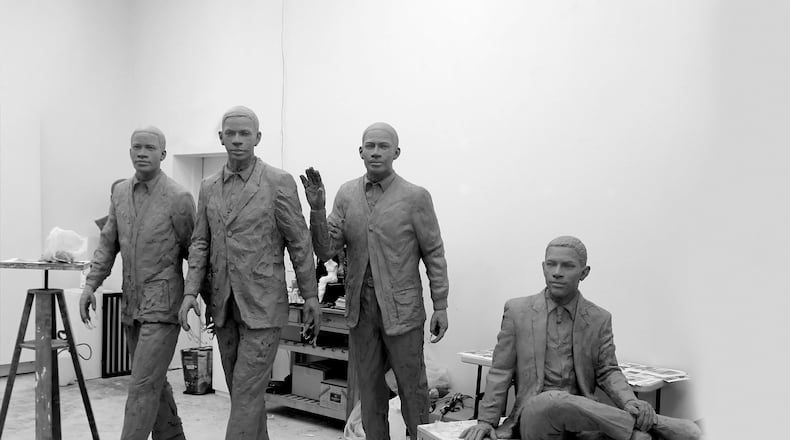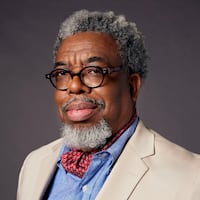In September of 1961, nine months after protests and violence greeted the first two black students to integrate the University of Georgia, Ralph A. Long Jr., Lawrence Williams and Ford C. Greene quietly, and uneventfully, enrolled at Georgia Tech.
A year later, Ronald Yancey followed and in 1965 would become the first black student to graduate from Georgia Tech.
“The school and the community of Atlanta embarked on this challenge to integrate, and the students were determined that they were not going to embarrass Tech,” Long said Tuesday.
On Wednesday, Georgia Tech will honor the four students with the dedication of two bronze sculptures on campus.
“The Three Pioneers” sculpture — honoring Long, Williams and Greene — will be placed in Harrison Square, named in honor of Edwin D. Harrison, Georgia Tech’s president at the time of their arrival.
“The First Graduate” sculpture — recognizing Yancey — will be installed in the heart of campus near the G. Wayne Clough Undergraduate Learning Commons.
“When we thought about Georgia Tech’s progression of becoming a more diverse institution, and as we look to build upon our past, we wanted to honor them in a way that showed their courage and what they meant to the Institute,” said Archie Ervin, vice president of diversity at the school. “They changed the course of this great university.”
Before the students arrived, Georgia Tech, like many large Southern universities, was mostly white.
But in May of 1961, President Harrison said integration was necessary “to forestall the possibility of federal intervention and to maintain administrative control over the school’s admissions.” He had watched what was happening at the UGA, where Charlayne Hunter-Gault and Hamilton Holmes were harassed by hostile crowds of students and locals.
“Tech made it very well known that they would not have any problems with their student body, and everyone pretty much respected that,” Long said.
Not that there wasn’t discrimination at Tech.
Long said that when the three students arrived on campus for orientation, they were escorted by a state patrolman. Williams said he got into a fight after his first math class because he was intentionally tripped. There were isolated threats. Because they were all from Atlanta, they found it easier to live at home, rather than risk staying on campus.
But, for the most part, there was little resistance, making the college the first major school in the Deep South to integrate peacefully and on its own accord.
“They carried themselves with great dignity. They were well-dressed. They were well-mannered. They were well-spoken. And they did an excellent job in lowering the expectations of problems people expected from them,” said Yancey, in a 2011 interview marking the 50th anniversary.
Still, flagship schools in Mississippi and Alabama didn’t follow Tech’s lead in subsequent years and saw violent confrontations.
“There was some thought given to making the Tech experience different and a desire to make this something that was not violent and not reactionary,” Ervin said. “Georgia Tech integrated because it was the right thing to do.”
Today, Tech ranks as one of the most diverse big colleges in the nation. In 2018, the last year the numbers were verified, 45.2% of Tech’s students were white and 36% were Asian.
But only 5.8% of the students were black. That percentage ranks last among Georgia's five largest public universities.
Long and Greene arrived at Tech from Henry McNeal Turner High School in Atlanta, the same school that UGA’s Hunter-Gault and Holmes had attended.
Williams and Yancey, who arrived on campus a year later from Morehouse, had attended Washington High School.
“I was going to Northwestern on a tennis scholarship,” Long said, adding that he also considered Morehouse, Clark College and MIT. “But we were chosen to go to Tech.”
None of the students ever lived on campus.
“We just went to our classes and went home. But other than a few catcalls, we didn’t have any problems,” Long said. “The only real problem was being ignored.”
None of the three initial students who integrated Tech graduated from there. Williams was drafted into the Air Force. The other two transferred to historically black schools — Greene, to Morgan State University; Long, to Clark, where he won the conference championship in tennis.
The trio, along with Yancey, will attend the 3 p.m. dedication ceremony at Harrison Square, behind Tech Tower, at 225 North Ave.
“This is a tremendous and resounding honor when you think about it,” Long said. “I have talked to people who are amazed that Tech would do this. But, at the same time, I realize that we contributed to what that institution is today.”
The Black Yellow Jackets
Ford Greene is an independent management and telecommunications consultant. After attending Georgia Tech, he received his bachelor's degree in computer science and mathematics from Morgan State University. He has also completed postgraduate courses at the Darden School of Business at the University of Virginia (MBA Certificate Program) and at Johns Hopkins University.
Ralph Long Jr. is a pioneer in the field of information systems and information technology. After attending Georgia Tech, he graduated from Clark College (now Clark Atlanta University) with a dual degree in mathematics and physics, and became the first black systems engineer for the Large Systems Group in the southeastern United States at IBM Atlanta.
Lawrence Williams was drafted into the Air Force in 1967 and served honorably in the Vietnam War. During his service, he earned several distinctions and honors. He was selected for the Drum and Bugle Corps in basic training and also chosen for leadership training school, where he graduated at the top of his class. After retiring from the military, he traveled the world lecturing on the topics of aerospace and aviation.
Ronald Yancey became Georgia Tech's first African American graduate in 1965, earning a degree in electrical engineering. Yancey went on to have a successful career with the Department of Defense before moving to the private sector. He has served on the Georgia Tech Alumni Association Board of Trustees.
About the Author
Keep Reading
The Latest
Featured










